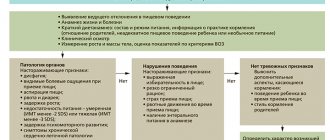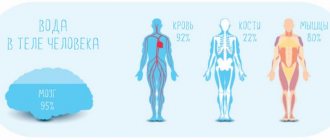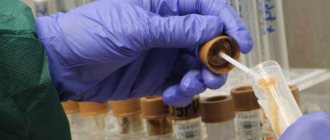Types and causes of occurrence
Loss of appetite can be absolute (anorexia), partial (hyporexia) and reduced (eating food, but in small quantities with a constant feeling of hunger). At the initial appointment, the doctor at the Kuntsevo Medical and Rehabilitation Center identifies one of these reasons that caused the loss of appetite:
- diseases of the intestines, stomach, gall bladder, pancreas,
- infectious diseases,
- helminthic infestations.
In addition, experts note psychological instability and the use of certain medications as the cause of loss of appetite.
Need strength for something else
Sometimes the body turns off its appetite because more important processes are occurring in it that need to be directed toward.
Intoxication due to illness . When you have ARVI, flu, or other inflammatory diseases, sometimes you don’t feel like eating at all. Microbes and viruses that cause them release many toxins during their life processes. The liver must remove them. Since it is actively involved in the digestion process, the body decides to remove the additional burden from it.
Stress. When we are nervous, the hormones adrenaline and cortisol are released into the blood, which increase heart rate, breathing, and increase sweating. The brain needs to regulate all these processes, and it is distracted from digestion. True, this is typical only for acute stress. If it is hidden and sluggish, many people, on the contrary, try to console themselves with food.
What should I do?
If you don’t feel like eating, during an acute period of illness (against the background of a high temperature), you can get by with vitamin drinks: juices, fruit drinks, tea with honey. But when it gets better, you need to eat so that the body can replenish lost energy. Priority is given to light protein dishes, vegetables and fruits rich in vitamins A and C.
Article on the topic
Why do children love “all sorts of nasty things”? A child's taste and appetite are formed even before birth.
You need to force yourself to eat even after nervous tension. When it subsides, the body is depleted - its resources need to be restored. Products rich in magnesium are especially important for this: nuts, legumes, buckwheat, cabbage, beef.
Which doctor treats loss of appetite
There is no need to ignore such a symptom as decreased appetite. With this problem you need to contact a gastroenterologist.
To make an appointment, choose any method:
- call the clinic +7 (495) 103-99-55,
- order a call back,
- leave a request for an appointment using a convenient form on the website:
Loss of appetite may indicate the development of various pathologies in the patient’s gastrointestinal tract: from helminthic infestation to infectious lesions and disorders at the enzymatic level.
IMPORTANT! In any case, persistent loss of appetite requires consultation with a specialist from the Kuntsevo Medical and Rehabilitation Center. Our experienced gastroenterologists will conduct a full diagnosis to determine the source of the symptom in order to then eliminate the found cause.
Make an appointment with a gastroenterologist at our center - and regain your previous quality of life, without unpleasant alarming symptoms!
SIGN UP
Causes of lack of appetite
Pregnancy
Due to severe toxicosis and repeated painful bouts of vomiting, pregnant women in the first trimester often refuse food. In severe forms of the disease, even the smell and sight of food provokes vomiting, so women drink only water. It is possible to lose more than 5% of body weight in a few days and become severely dehydrated, which poses a danger to the health of the mother and child. Severe toxicosis is an indication for inpatient treatment.
Anorexia nervosa
Loss of interest in food and a sharp reduction in portions are typical already at the initial stage of the disease. The manifestations are caused by a pathological desire to lose weight and constant dissatisfaction with one’s body, even if there is no apparent reason for this. At first, a person may feel hungry, but prefers to maintain strict dietary restrictions. As anorexia progresses, the feeling of hunger disappears, and patients drink only water, tea or coffee for weeks.
Lack of appetite is combined with severe weakness, drowsiness, and loss of ability to work. All systems of the body suffer, metabolic processes are disrupted, therefore, when trying to force feed a patient with anorexia, he begins to vomit, and painful cramps appear in the abdomen. This condition is dangerous to health and life and requires qualified medical care.
Psychological problems
Appetite often decreases with depression, when there is a loss of motivation and interest in life, and a person becomes indifferent to what is happening. Many patients claim that they have ceased to feel the taste of foods. Frequent skipping of meals up to the point of starvation is typical. The symptom also develops during intense acute and chronic stress and emotional shock.
Infections
A short-term lack of appetite occurs in the acute period of all infectious diseases, which is caused by massive intoxication of the body with decay products of microbial cells and the accumulation of inflammatory mediators. During the entire febrile period, patients either completely refuse to eat, or eat light, low-fat meals (thin soups, cereals) a couple of times a day.
Appetite is restored after the temperature normalizes; during convalescence, an increased feeling of hunger is noted. In the chronic or latent course of infectious processes, lack of appetite occurs against the background of other symptoms: weakness and weakness for no reason, night sweats, periodic headaches and dizziness. The main infectious factors that cause loss of appetite:
- Respiratory diseases
: influenza, infectious mononucleosis, adenovirus and rhinovirus infections. - Intestinal infections
: salmonellosis, dysentery, food poisoning. - Liver damage
: viral hepatitis, echinococcosis, alveococcosis. - Sluggish processes
: tuberculosis, brucellosis, HIV infection.
Intoxication
Lack or decreased appetite is caused by various reasons: poisoning with chemical compounds and toxic industrial products, endogenous intoxication (with uremia, liver failure). The symptom becomes a consequence of damage to the autonomic centers of the brain, a general serious condition. Aversion to food as a component of asthenic syndrome sometimes persists even after detoxification measures.
Gastrointestinal pathologies
Chronic diseases of the gastrointestinal tract are accompanied by signs of constant dyspepsia, which provoke a complete absence or decrease in appetite. Sometimes patients independently limit themselves in food, since after eating the intensity of the discomfort in the stomach usually increases. Characteristic is gradual weight loss and exhaustion of patients. The most typical causes from the gastrointestinal tract, causing complete or partial lack of appetite:
- Diseases of the gastroduodenal zone
: hypoacid gastritis, peptic ulcer, duodenitis. - Intestinal pathologies
: chronic enteritis and enterocolitis, dysbiosis, bacterial overgrowth syndrome. - Damage to the digestive glands
: pancreatitis, toxic and autoimmune hepatitis. - Functional disorders
: dyspepsia, irritable bowel syndrome.
Endocrine diseases
Hormonal imbalances lead to changes in metabolic processes, a decrease in catabolic reactions, which is why appetite decreases or is lost. The symptom is characteristic of hypothyroidism. With this disease, patients eat significantly less, but do not lose weight, and sometimes, on the contrary, gain weight. There is also coldness and swelling of the skin, constant drowsiness, weakness, and apathy.
Similar symptoms occur with hypopituitarism - insufficient function of the pituitary gland. A decrease in the production of all regulatory hormones slows down metabolism and reduces a person’s need for food. Lack of hunger is associated with concomitant damage to the brain structures responsible for the formation of appetite. The combination of loss of desire to eat with a change in skin color to “bronze” is a typical manifestation of Addison's disease.
Tumors
A complete lack of appetite, which is accompanied by unmotivated weakness, lethargy, and weight loss, is a component of the “minor signs” syndrome in cancer pathology. At first, patients need less food to feel full, then the desire to eat disappears, and the frequency of meals is reduced to 1-2 times a day. Atypical eating habits appear, for example, stomach cancer is characterized by an aversion to meat products.
Rare causes
- Autoimmune processes
: rheumatism, systemic lupus erythematosus, scleroderma. - Cardiovascular pathology
: chronic heart failure, ischemic heart disease, infective endocarditis. - Neurological disorders
: senile dementia, Alzheimer's disease, consequences of severe TBI. - Mental illnesses
: schizophrenia, bipolar disorder. - Complications of pharmacotherapy
: long-term use of cardiac glycosides, antibiotics, chemotherapy drugs.
How to stop losing weight and gain lost kilograms?
Cancer is one of the biggest threats to human life. In many cancers, sudden weight loss is one of the most dangerous manifestations. And this should be an urgent reason to visit a doctor.
The main problems of most cancer patients are related to the consumption of low amounts of protein and insufficient calories. Eating high-calorie and protein-rich foods is essential to provide energy to help the body fight disease.
Dietary recommendations for cancer:
- good sources of protein include lean meat, fish, poultry, nuts, dairy and/or soy products;
- To gain strength and feel better, patients are advised to take vitamins, minerals, and carbohydrates (fruits, vegetables and whole grains).
Not having enough of these nutrients can cause cancer patients to feel tired, weak, and less able to cope with treatment.
Even if the process of depletion of the body has already gone too far, doctors are faced with the task of maintaining the life of the patient and improving his condition. The measures taken are aimed at eliminating symptoms that negatively affect the supply of nutrients: damage to the mucous membranes, nausea and vomiting. Medicines are also prescribed to relieve pain and improve appetite.
Diagnostics
Patient examination
- Assessing the degree of dehydration.
- Determination of symptoms of acute surgical pathology.
- Neurological status, assessment of clarity of consciousness.
Recommended tests
- Blood tests (general, biochemistry, thyroid hormones, sugar levels).
- General urine test and pregnancy test.
- Stool analysis (coprogram, worm eggs, culture).
Recommended Research
- Ultrasound of the abdominal cavity and endoscopy.
- X-ray and colonoscopy.
- CT/MRI of the intestine, brain.
Cachexia - symptoms and treatment
The goals of treating cachexia are:
- restoration of normal body weight (at the same time, menstruation and normal ovulation in women, as well as libido and hormonal balance in men are restored);
- increasing the patient's motivation and willingness to cooperate to restore normal eating patterns and participate in treatment;
- training in healthy nutrition and its organization;
- correcting irrational thoughts, attitudes and beliefs;
- treatment of concomitant mental disorders;
- stimulating family support, conducting consultations;
- preventing relapse of the disease.
When determining a treatment algorithm, first of all, it is necessary to find the underlying disease that led to the development of cachexia in a particular patient:
- limiting the amount of food or completely refusing to eat in order to lose weight;
- increased breakdown of muscle tissue (catabolism) against the background of concomitant pathology;
- the development of sarcopenia - atrophy of skeletal muscles, in which older people gradually lose muscle mass and strength;
- mental and physical development disorders.
Treatment of cachexia begins with the selection of a method of nutritional support , since not only the digestive function is disrupted, but also the absorption of nutrients by cells and tissues, metabolism and the vital functions of the body. Nutritional support includes two methods:
- parenteral nutrition - the introduction of nutrients into the body by intravenous infusion through a dropper, bypassing the digestive tract;
- enteral nutrition is the introduction of nutrients into the stomach or intestines through a gastric tube or gastrostomy tube, i.e. food will go directly into the stomach, bypassing the oral cavity and esophagus [11][12][13].
Patients who are able to eat are recommended to frequently consume high-calorie foods in small quantities - eggs, liquid nutritional supplements, etc. Although these supplements and an increase in caloric intake have a positive effect on the body, the underlying process of cachexia cannot always be stopped, as it can cause syndrome of other diseases. For example, cachexia naturally develops in a cancer patient.
Eliminating nausea, constipation, changes in taste, shortness of breath, and depression can significantly improve the patient’s condition. For patients with persistent anorexia, the optimal treatment method is pharmacotherapy , which is primarily aimed at stimulating appetite. Numerous studies confirm the effectiveness of this treatment in individual patients, but it does not reverse the development of cachexia.
Synthetic progestins, megestrol acetate and medroxyprogesterone, can stimulate appetite They are used only in complex therapy with other drugs. In 5% of patients, side effects may occur due to their use: skin rash, disruption of the menstrual cycle and adrenal function, increased blood glucose, and a tendency to form blood clots.
Corticosteroids, hormonal anti-inflammatory drugs, are used to treat anorexia. These include: dexamethasone, methylprednisolone and prednisolone. They also improve your appetite and overall quality of life. The effect of their use occurs during the first two weeks of treatment. However, these drugs can also cause a number of undesirable effects: myopathy (muscle atrophy), decreased skin elasticity, adrenal insufficiency, decreased cell sensitivity to insulin, insomnia, deterioration of memory, attention, and disability [15][18].
Appetite stimulants with antiemetic effects include cannabinoids (such as dronabinol). They can be used in cases of cancer. Taking them can be complicated by euphoria, hallucinations, psychosis, and disruption of the cardiovascular system.
Correcting metabolic disorders involves supplementing with fatty acids such as omega-3. They stop the rate of muscle breakdown and have a positive effect on the metabolism of fats and proteins.
Complex treatment also needs to include a drug that normalizes energy in the cell - hydrazine sulfate. The dosage of this medicine is gradually increased.
In addition to pharmacotherapy, full treatment of cachexia includes consultations with other specialists - a psychotherapist or psychologist, palliatologist, gastroenterologist, etc. They will help correct factors that indirectly affect the progression of cachexia. For this purpose, it is necessary to select a pain therapy regimen and prescribe various drugs (according to indications):
- gastrokinetics, stimulating gastric motility;
- antiemetics - antiemetic drugs;
- enzyme preparations that improve the digestion process;
- hepatoprotectors that protect the liver;
- intravenous iron, cobalamin (vitamin B12) and folic acid to treat anemia;
- means for the treatment of diarrhea and diarrhea.










